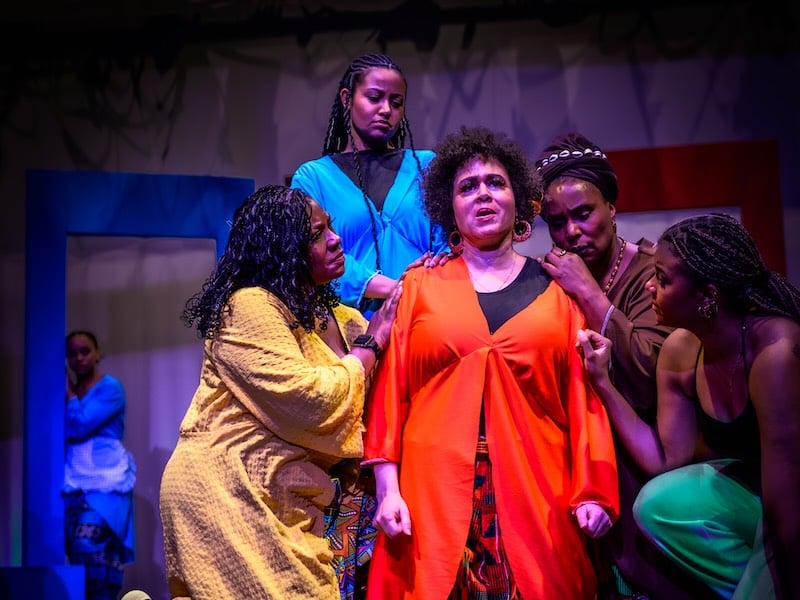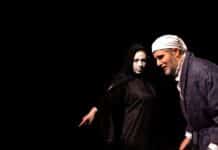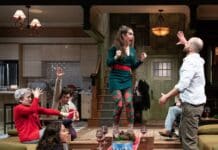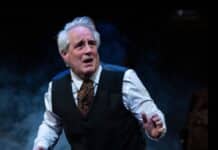2nd Star Productions’ performance of for colored girls who have considered suicide/when the rainbow is enuf is a poetic depiction of Black women’s struggles and triumphs. Written by Ntozake Shange, this “choreopoem” blends words, music, and dance in different poems or scenes to allow Black women to tell their own stories. Directed and choreographed by Rikki Howie Lacewell, it is a fitting and needed show for Black History Month.
Temple Fortson and Jo Monplaisir play the ladies in red with strength. In the scene titled “no assistance” they proudly end a relationship, throwing back a potted plant their lover gave them. In “one” they describe a woman confident in her sexuality, who enjoys the attention of men but kicks them out of bed when they’re done.

Rowan Campbell and Vanessa McNair give a fierceness to the ladies in blue. In “now I love somebody more than,” they sing of finding the power to love themselves. “abortion cycle #1” has them terrified of being pregnant. In “I usedta live in the world,” they talk about the grime and smallness of Harlem, of taking the subway and the retorts they must shout to fend off unwanted attention. In “no more love poems #3,” they sing of desiring love and connection but not finding it.
Iyanu Bishop and Danielle J. Curry weave compelling stories as the ladies in purple. In “sechita,” they tell of a dancer subjected to humiliation and abuse. In “pyramid” they speak of two women, friends, for whom a man comes between them, loving them both.
Sonja Dinkins plays the lady in yellow with longing and desire. In “graduation nite,” she joyfully relates her class’ graduation party, filled with music, teenage sexuality, and cars. At the end, she realizes people look at her like “she’s a woman.” In “no more love poems #4,” she weeps with wanting connection yet finding none. As she laments, “being alive, being a woman, and being colored is an existential dilemma.” In “my love is too,” she lists her qualities, her strengths, that she will not allow “to be thrown in my face.”
Cheramie J. Jackson plays the lady in orange with passion. In “i’m a poet who,” she sings of her love for Latin dances and how she ran away as a teenager to see the musician Willie Colon perform. In “no more love poems #1,” she speaks of dance helping her through a painful breakup.

Dionne Belk brings an excitement to the lady in brown. In “toussaint,” she joyfully describes discovering the Haitian rebel leader at the library, how she connected with his story, and how he followed her as she explored St. Louis.
Imani Corbin gives rage to the lady in green. “somebody almost walked off wid alla my stuff” has her railing against people, especially lovers, who try to take her essential values and sense of self. She confronts them and snatches them back. In “sorry,” she angrily decries those, mostly men, who shallowly apologize for their behavior but refuse to change.
Lauren Baker, Erin Elise Diamond, and Amariya Kailo bring wisdom to the ladies in multicolor. “ego” finds them speaking of “we” over “I” and the importance of community.
Set Designers Rikki Howie Lacewell and Jane B. Wingard and Properties Designer Doreen Roberts enhance the symbolism of the show with arches of different colors, one rainbow colored, at the back of the stage. Colored boxes are beside each arch, which the performers use to sit in some scenes. In one scene, performers carry bags labeled with qualities like “Self-Respect” and “Honor.” Costume Designer Jeaneo Binney and Hair and Makeup Designer Shemika Renee make each performer immediately distinguishable in different colored wraps, as well as shawls.
The Bowie Playhouse staff handles the lighting design, with different colors used for different emotional states. In one dramatic moment, the lights turn red. For one scene, the stage is dim, with scattered spotlights following the performers across the stage. The sound design, by Director Rikki Howie Lacewell, evoking various sound effects like a subway announcer or a PA system at a health clinic, was executed effectively by Sound Programmer Davis Wooten-Klebanoff and Sound Board Operators Peyton Bramble and Tyler Hart.
Music Director LeVar Betts brings original music to this production and, along with Virgil Boysaw III, performs this music, keyboard, and drums in the background for some scenes, while in others the performers dance to them. Lacewell keeps the energy high with much lovely dancing and movements involving solos and multiple combinations. The performers hit the right comic and emotional moments. The entire cast tells a quietly tragic story in “positive,” while the ladies in red and orange enact a harrowing tale in “a nite with beau willie brown.” While certainly more of a poem than a traditional play, each scene quickly makes sense in its theme; some even lead naturally into each other. In these troubling, uncertain times, for colored girls… feels necessary, showing the importance of community, honesty, and love.
Running Time: 90 minutes with no intermission.
for colored girls who have considered suicide when the rainbow is enuf plays through March 1, 2025 (Fridays, Saturdays, and Sundays), presented by 2nd Star Productions performing at The Bowie Playhouse – 16500 White Marsh Pk Dr in Bowie, MD. For tickets ($29 general admission; $26 for seniors 60+, active military, and students; $18 for children under 12), buy them at the door or purchase them online, call 410-757-5700, or email info@2ndstarproductions.org.
The program is online here.
for colored girls who have considered suicide / when the rainbow is enuf
Written by Ntozake Shange
Directed by Rikki Howie Lacewell



